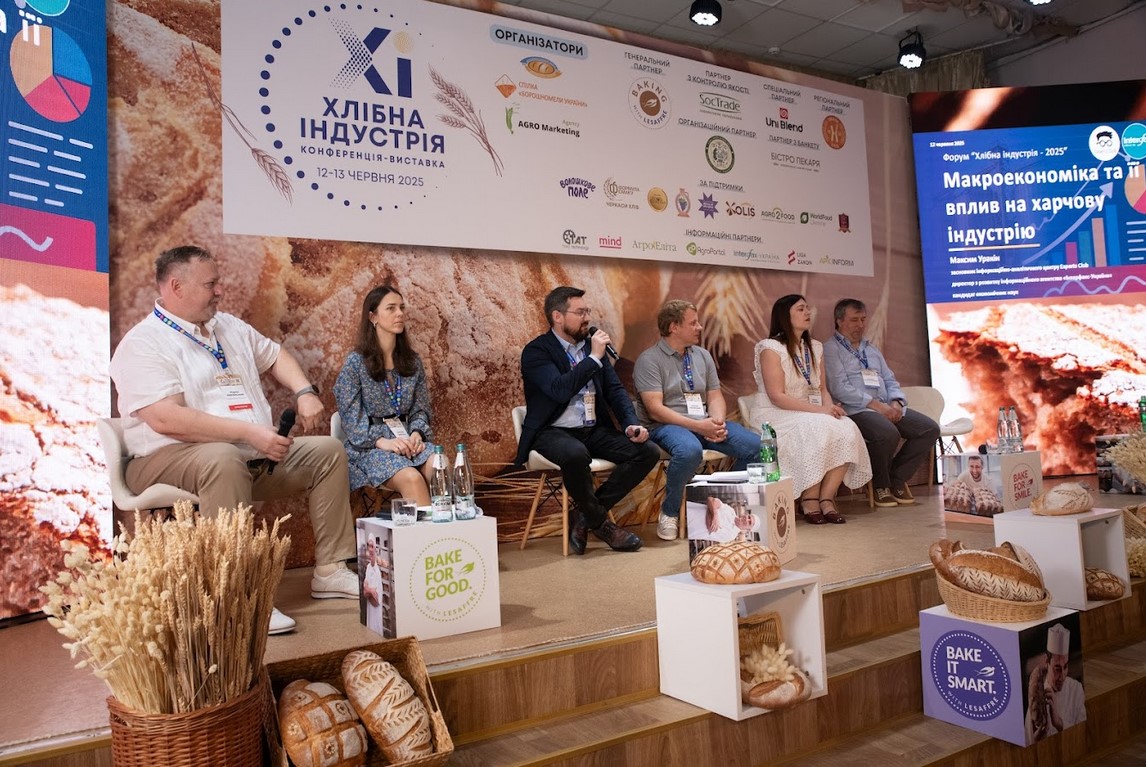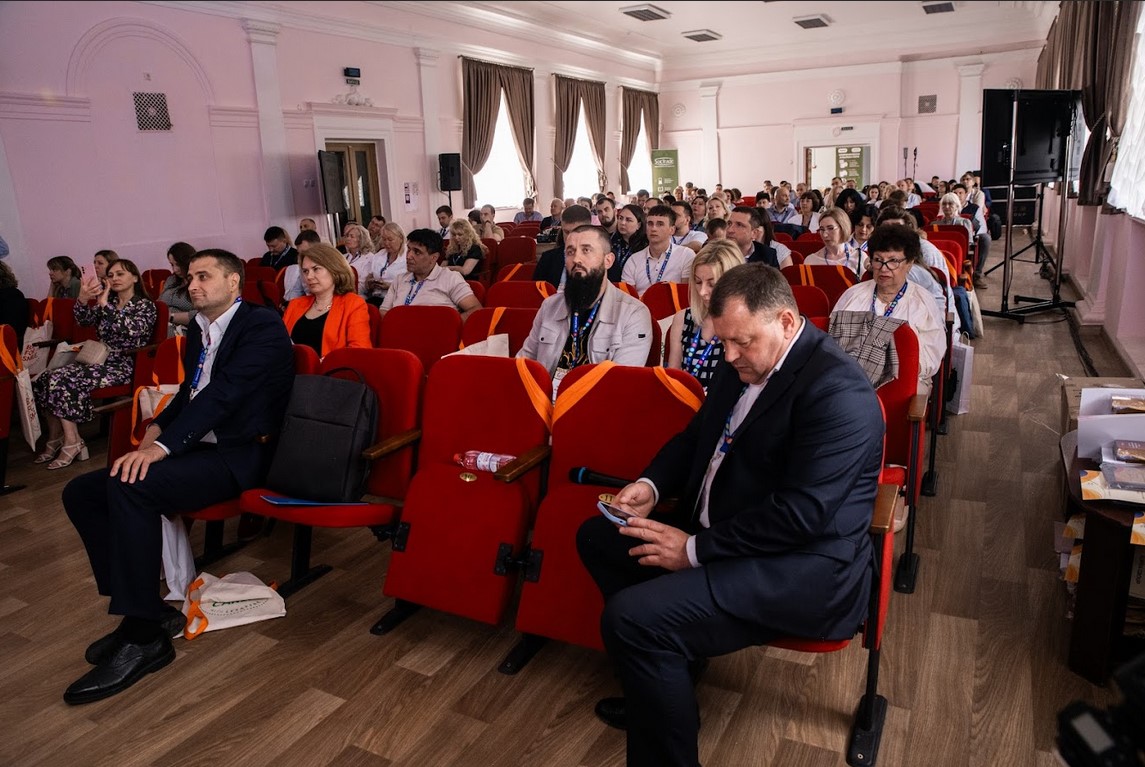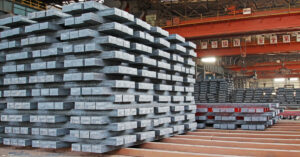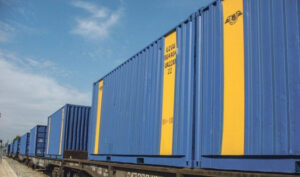
The volume of foreign trade in dairy products in the first half of June 2025 amounted to $ 19.5 million, which is 29% less than in the first half of May (-29%), according to the expert and analytical service of the Union of Dairy Enterprises of Ukraine (UDEP).
The industry association noted that exports of dairy products decreased by 44%, imports by 4%. The ratio of exports/imports in June was 0.96, in May – 1.6, in April – 1.2 times.
At the same time, the share of non-condensed milk and cream in the export structure decreased by 47%, milk and cream by 58%, whey by 50%, butter/milk fats by 51%, and cheeses of all kinds remained virtually unchanged.
At the same time, imports of fermented milk products decreased by 6%, and imports of all types of cheeses also by 6%.
“Export volumes in June will be the lowest since January of this year,” the UMSU predicts.

On June 12-13, Uman hosted a key industry event – theBread Industry 2025 business forum. More than 200 participants from all over Ukraine – business owners, technologists, analysts, government representatives, specialized associations and suppliers – gathered to outline a common vision of the future of the baking, flour milling and grain processing industries.
The event was organized by the All-Ukrainian Bakers Association, the Union of Millers of Ukraine and Agro Marketing Agency. This year’s event was hospitably hosted by Uman National University, one of the key agricultural universities in the country.
Lesaffre Ukraine was the general partner, SocTrade was the quality control partner, Uni Blend was a special partner, Umankhleb and Umanpyvo were regional partners, Baker’s Bistro was the banquet partner, and Experts Club was the official information and analytical partner of the forum. The forum was supported by Cherkasy Regional State Administration, OLIS, TM “Voloshkove Pole”, Cherkasy Bread, Wine of Ukraine, Food & Drinks, Ukrvinprom, Agro 2 Food, World Food Ukraine, Ukrkondprom. Interfax-Ukrainewas the official media partner.
The forum combined three thematic sessions, an industry discussion, practical insight sessions, master classes, and a solutions exhibition – the event was designed as a platform for the exchange of ideas, cases, and analytics that already affect business efficiency and sustainability.

Government position: dialog, support, forecasts
The first day of the forum was opened with a session on government policy and its impact on the processing industry. Taras Vysotskyi, First Deputy Minister of Agrarian Policy, presented an updated harvest forecast for 2025, as well as state support mechanisms available to processors. The focus was on the ministry’s openness to a systematic dialogue with the market, in particular to adapt programs to the real needs of enterprises.
Roman Kropyvnytskyi, Director of the relevant department at the Ministry of Economic Development and Trade, emphasized the importance of effective use of existing state support instruments, called on businesses to provide active feedback and stressed that strategic changes are possible only if all players in the chain cooperate.
Oleksandr Ignatov, Director of the Department of the State Labor Service of Ukraine, spoke about the upcoming updates to labor legislation, which should take into account the real labor relations between employers and employees. The topic aroused keen interest in the audience as it is directly related to the work of manufacturing companies.
There were constructive signals from the agrarian market: Andrii Dykun, Head of the UAC, focused on price risks and uneven margins in 2025 for wheat producers, and Oleksandra Avramenko, UCAB analyst, pointed out the challenges associated with the harmonization of Ukrainian legislation with EU standards.

Flour milling industry: export pressure and struggle for raw materials
The key focus was on the availability of milling wheat and the stability of the domestic flour market. Rodion Rybchynsky, Director of the Union of Millers of Ukraine, noted that with the beginning of full-scale armed aggression in Ukraine, flour production has significantly decreased and the structure of its exports has changed. Two issues are critical for the industry today: the availability of raw materials due to active wheat exports and the return of quotas on exports to the EU, which have become a key market for Ukrainian flour over the past three years.
In turn, Maksym Rychlovsky (Newsfera) drew attention to the loss of the domestic rye market – the crop has virtually ceased to be grown, which leads to import dependence in the production of rye flour and the risk of complete disappearance of the corresponding bread varieties.
Maksym Urakin (Experts Club, Interfax-Ukraine) analyzed the macroeconomic impact on bread production and consumption trends. He noted that in 2025, key macroeconomic indicators will again come to the fore. Inflation, projected at 12%, raises questions about the impact of costs on consumption. Changes in prices for certain products are noticeable in the country’s economy and can significantly change business models. At the same time, according to M. Urakin, the projected GDP growth of 2.9% opens up new prospects, but it is also necessary to take into account variations in the discount rate and the hryvnia exchange rate, which may aggravate the situation in the coming years.
Olena Lapshova (Lesaffre Ukraine) presented the international context: consumers expect not only environmental friendliness, but also confirmed evidence of quality, simplicity, and benefit from a product. These global trends will continue to influence the development of the Ukrainian industry, so today they should be taken as a benchmark for business development. Natalia Savosina (SocTrade) focused on full quality control – from field to shelf. Her presentation was devoted to technological solutions that ensure accuracy and safety at all stages of flour and bakery production.

Technology, marketing and new development priorities
The third session of the forum was dedicated to modern technological solutions and marketing approaches that shape the future of the bread industry. The session was moderated by Yuriy Duchenko, First Vice President of the UBA, Director of Kyivkhlib LLC. Opening the session, he noted that the quality of Ukrainian flour is not only a guarantee of stable domestic consumption, but also a key to success in foreign markets. The Ukrainian industry already has the potential to meet the highest standards, but it needs a unified vision and investment in quality stability and traceability.
Prof. Dmytro Zhygunov identified the main challenges related to the state of Ukrainian wheat, particularly in the context of baking properties. He noted that the industry needs a systematic analysis of the raw material base and a rethinking of the grain selection criteria, taking into account the intended use of flour.
Svitlana Shynkarenko, Head of Technology at Lesaffre Ukraine, PhD, in her speech described how freezing technologies not only optimize logistics or facilitate production forecasting, but also become a driver for creating an emotional product that meets the expectations of modern consumers. She paid special attention to the control of fermentation in freezing conditions, preservation of organoleptic properties and the role of yeast solutions in shaping the taste.
Sergiy Tsekhmistrenko, Director of Uni Blend, spoke about targeted technological solutions as an element of increasing the efficiency of bakery production. His report contained specific cases, such as the introduction of adaptive mixes to meet the requirements of a particular enterprise, modification of recipes to improve the stability of baked goods, and examples where the introduction of mixes reduced production losses and increased the yield of finished products.
Oleksandr Vereshchynskyi, Doctor of Technical Sciences, co-founder of OLIS, delivered a report that became a concentrate of strategic advice for owners and engineers of manufacturing enterprises: how to avoid common design mistakes, which components require the most careful attention, how to combine energy efficiency with grinding accuracy. He also emphasized the importance of integrating laboratory control into the real mill production cycle as a tool for sustainability and savings.
Olena Sinitsyna, founder of Favorite Food & Drinks, provided a practical guide to negotiating with foreign retailers: new requirements for documentation, logistics, recipes, price indexation and compliance with local regulations. She noted that Ukrainian producers have a good chance of securing contracts, provided they are flexible and professionally trained.
Bohdan Shapoval (Ukrainian Food Association) concluded the session by adding information on Private Label trends in the EU, the role of Ukrainian industry associations in promoting products, and the barriers that still need to be removed for sustainable exports. He emphasized that the new stage of cooperation with European networks is a challenge but also an opportunity for Ukrainian companies to become part of the global supply chain.
This block of the forum clearly demonstrated that technology and marketing are increasingly integrated. The future of the bread industry lies in personalized solutions, precise investments, flexible production and a systematic marketing presence in the market.
A game-changing discussion
The public discussion between bakers and retailers was a separate block. It was frank, dynamic, and sometimes conflicting – it was the culmination of the first day. The moderator was Lyudmyla Khomychak (Ministry of Agrarian Policy). The discussion centered on pricing, logistics, specifics of contracts and quality requirements. The participants agreed that this conversation should be regular and result in a revision of the procurement policy in terms of predictability and fairness of conditions for both parties.
Lesaffre intensive and Uni Blend master class
The second day of the forum was opened with an insight session by Lesaffre Ukraine. The participants worked in depth on optimizing dough preparation, innovations in fermentation, and efficiency in freezing bread products. After the session, the Uni Blend team held a practical master class at Uman National University, where they presented modern mixes, baking technologies and approaches to recipe adaptation.
The Forum “Bread Industry – 2025” has become an event that not only captures the problems, but also offers solutions – strategic, tactical and applied. It identified challenges, gathered the market on one platform, and launched important processes – from revising the procurement policy to updating technological approaches. A challenging marketing season, new trade rules with the EU and the fight for consumers lie ahead. But after the Bread Industry 2025, the industry will come out with new benchmarks. The next meeting will be held in 2026. And, given the dynamics, it will be even more ambitious.
Interfax-Ukraine is a media partner

Tour operator Join UP! has served more than 145 thousand Ukrainian tourists since the beginning of the year, compatriots choose tours lasting 7-10 days from 450-500 euros per person, said Iryna Mosulezna, managing director of Join UP! in Ukraine, to Interfax-Ukraine.
“Despite the difficult circumstances, Ukrainians are increasingly planning vacations. Today, vacations are perceived not as a luxury but as a necessity for mental recovery, and this directly affects the travel market. We have been seeing positive dynamics for several years in a row. If in 2022, 158,675 tourists used Join UP! services, in 2023 – already 238 thousand, and in 2024 – 260 thousand. And in the first half of 2025 alone, we have already had more than 145 thousand tourists,” Mosulezna said.
According to the company, on average, Ukrainian tourists choose tours lasting from 7 to 10 nights. The cost starts at around 450-500 euros per person, depending on the destination, hotel type, and season.
The most popular destinations with all-inclusive programs are Turkey and Egypt.
“At the same time, Ukrainians have become more likely to book in advance: we received the first bookings for October 2025 in September 2024. This trend is gradually bringing us back to pre-docking and pre-war planning habits,” says Mosulezna.
Among the new hits of the season is the Aegean coast of Turkey, which offers a more European type of vacation, a calmer rhythm and opportunities for independent leisure.
In Egypt, the new El Alamein resort is of great interest – a modern all-inclusive format that surpasses the usual ideas about vacationing in this country.
The popularity of European destinations is also growing. In 2025, in addition to Barcelona, Join UP! opened new charter flights to Alicante and Palma de Mallorca. The company is also actively working with Greece, which provides even more options for summer vacation.
“We are also currently seeing an increase in demand for economical bus tourism, especially among travelers from the south of Ukraine. The most popular destination is Bulgaria, as the nearest and most affordable seaside resort. Tourists also choose tours to Turkey, Greece, and Montenegro,” Mosulezna said.
As reported, the travel company Join UP! LLC was established in 2013, with an authorized capital of UAH 72 million 671 thousand. The ultimate beneficiaries are Yuriy and Oleksandr Alba.
The brand’s international expansion covers eight markets: the Baltic States, Kazakhstan, Moldova, Poland, Romania, and the Czech Republic. Preparations for the launch of operations in Slovakia and Hungary are nearing completion. Last year, the brand also opened its first international franchise agency in Katowice, Poland.

Ukrzaliznytsia (UZ) has revised the average daily speed of its freight rolling stock, increasing it by an average of 38%, according to the company’s press service.
“Ukrzaliznytsia has revised the average daily speed of its own freight rolling stock, which will make the use of the company’s cars much more profitable for customers. Carriers will spend less time on transportation and, therefore, pay less for the use of cars,” the company said in a statement on Thursday.
According to the company’s statement, the revised speed standards cover the following types of rolling stock owned by Ukrzaliznytsia: grain cars; tank cars; covered cars; cement cars; converted specialized rolling stock; container and fitting platforms. The new values came into effect on June 16 and will remain in force until December 31, 2025.
For fitting platforms, new speed limits have been set at the following levels: domestic and import transportation: wagon/container dispatch – 170 km/day (previously: 154 km/day); route or container trains – 197 km/day (previously: 154 km/day). For exports via land border crossings: wagon/container shipments – 213 km/day (previously: 139 km/day); route or container trains – 213 km/day (previously: 139 km/day). Transportation to port stations: wagon/container dispatch – 182 km/day (previously: 156 km/day); route or container trains – 264 km/day (previously: 156 km/day).
The updated speed indicators were established based on a detailed analysis of the actual movement of cars in the first half of 2025. In particular, it was found that for a number of types of rolling stock, the actual average daily speed significantly exceeds the current standards, according to the report.
“For rolling stock, the speed will increase by an average of 38%. This will allow shippers to deliver cargo in fewer days using Ukrzaliznytsia cars, which will directly reduce logistics costs and promote the development of container transportation both within Ukraine and to other countries,” Ukrzaliznytsia said.
The company’s CEO, Oleksandr Pertsovsky, noted that the significant acceleration of freight traffic standards will make orders for UZ cars more attractive to customers even in the current surplus market, as well as provide advantages in competition with private operators, which have recently dominated the market.

Farmers in three regions of Ukraine have begun harvesting early grains and legumes and have harvested 34,800 tons of grain from the new harvest from an area of 14,200 hectares, which is 28% less than a year earlier, according to the Ministry of Agrarian Policy and Food.
The ministry noted that in the Odesa, Kherson, and Mykolaiv regions, 33,900 tons of barley were harvested from an area of 13,600 hectares with a yield of 24.9 centners per hectare, and 900 tons of peas were harvested from 600 hectares with a yield of 15.2 centners per hectare.
According to the Ministry of Agrarian Policy and Food, the largest harvesting areas are expected in the Dnipropetrovsk, Kharkiv, Poltava, Vinnytsia, and Cherkasy regions, where the main work will begin in late June – early July.
The report states that this year, 1.398 million hectares are planted with barley in Ukraine, 210,400 hectares with peas, and early grains and legumes occupy a total of 11.1 million hectares.
As reported, the harvest in Ukraine in 2024 officially began on June 21, when farmers in the Vinnytsia, Dnipropetrovsk, Kirovohrad, Odesa, Mykolaiv, and Kherson regions harvested 48.3 thousand tons of grain from the new harvest, including 1.1 thousand tons of wheat with a yield of 22.0 cwt/ha, 39.9 thousand tons of barley with a yield of 29.8 cwt/ha, and 7.3 thousand tons of peas with a yield of 22.0 cwt/ha.

The subsidiary of Ukrzaliznytsia, TsTS Liski, has announced a tender for the purchase of 1,520 20-foot containers, including 1,020 Open Top containers and 500 Pallet Wide containers, according to a statement on Prozorro.
The open tender will be held according to the Dutch auction principle (price reduction – IF-U), with a starting price of UAH 469,088,082 (excluding VAT). The minimum price reduction step is 0.5% or UAH 2,345,440.
The auction is scheduled for June 27. The deadline for delivery of the containers is December 31, 2025.
According to the technical specifications, the Open Top container is designed for transporting a wide range of bulk cargo, hot pellets, and metal products. The container must have a steel all-welded frame.
The Pallet Wide container is designed for the transportation of a wide range of bulk cargoes that are explosion-proof, granular, and non-caking by rail, water, and road transport in domestic and international traffic. It must transport a wide range of piece goods on Euro pallets in width (two rows).